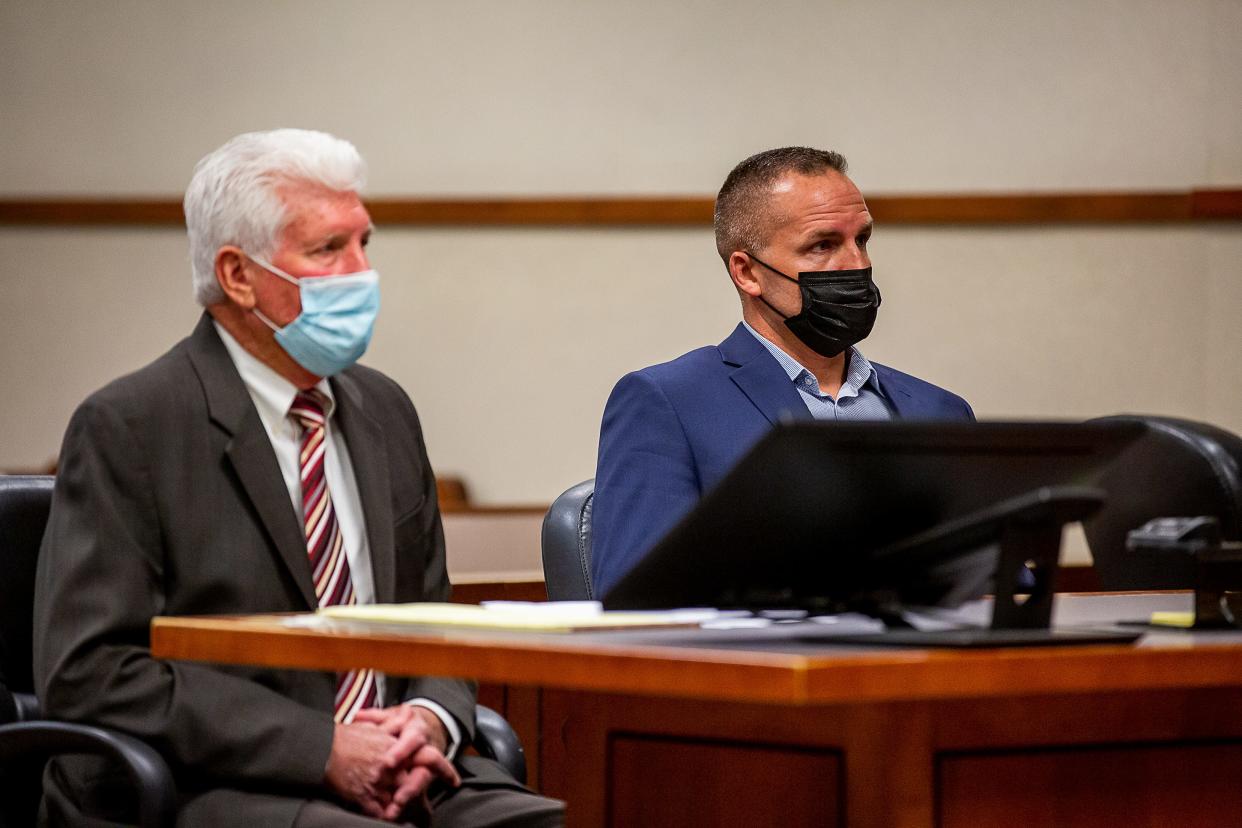Why the ex-cop charged in Breonna Taylor shooting wants media banned from part of his trial

LOUISVILLE, Ky. — An attorney for the former Louisville Metro Police detective awaiting criminal trial for his role in the shooting that killed Breonna Taylor is trying to bar the news media and public from part of court proceedings.
A motion filed by Stew Mathews, the attorney for Brett Hankison, who faces three counts of wanton endangerment in the March 13, 2020, shooting, asks a judge to prevent journalists and the public from watching individual voir dire — the questioning of potential jurors — set to begin Feb. 1.
The Courier Journal, joined by the Associated Press and WDRB Media, will oppose any efforts to close court proceedings, attorney Michael Abate said.
"The public has a fundamental interest in knowing justice is being done," Abate said, "and the way to do that is people are either able to observe or know that others are in the courtroom observing in case anything irregular happens."
The Attorney General's Office, which is the special prosecutor in the case, filed a motion opposing the closing of individual jury questioning.
"The commonwealth recognizes the competing interests between the right to an impartial jury and the right to public and media access," the motion says. "Here, the commonwealth believes the balance favors access, even if the court decides to place some limitations on that access."
Jury selection will begin Friday, when around 250 potential jurors will be summoned and given a questionnaire. Some of those jurors will then be instructed to return Feb. 1, for individual questioning, with general jury selection set to begin Feb. 22.
In the motion, Mathews argues coverage of Hankison's case "was prejudicial to the defendant and a lot of it was factually inaccurate and would be inadmissible as evidence at trial."
Mathews does not name any specific inaccuracies in the filing.
FACT CHECK 2.0: Separating the truth from the lies in the Breonna Taylor police shooting
He also says in "high publicity, controversial cases, jurors have a huge fear that their identities will be exposed no matter what protections are put in place to conceal their identities."
"To at least limit the reporting, whether by the media or by individual citizens, during the initial individual voir dire process would alleviate some of the potential for prejudicing" potential jurors, he wrote.
Media presence could also lead to a "chilling effect on the candor that is expected of the prospective jurors" and "influence the neutrality of the prospective jurors."
Abate, a First Amendment attorney, said the U.S. Supreme Court is clear on this matter. Jurors have the chance to raise sensitive issues with a judge in chambers or at the bench with a white noise machine, he said.
"But not once in the decision did they suggest the way to handle a case is to close down all voir dire (jury questioning)," he said. "In fact, the Supreme Court emphatically rejected that."
In a motion filed on behalf of The Courier Journal, the AP and WDRB, Abate writes that Mathews' legal argument is based on an outdated Kentucky Supreme Court opinion that was overturned just months later by the U.S. Supreme Court in a case called Press-Enterprise Co. v. Superior Court of California.
That opinion makes clear that Mathews arguments about potential jurors, "which are present in any case, are not enough to warrant closure of all individual voir dire."
In fact, Abate argued, the public attention on Hankison's case is all the more reason to keep court proceedings open.
Excluding the public and media "will only undermine faith that otherwise comes from the public seeing the Court and the advocates for both sides raise challenges to those they believe could not be impartial," he wrote.
There will be a hearing on the motion at 11 a.m. Wednesday with Circuit Judge Ann Bailey Smith.
In the event that Smith rules in favor of closing individual jury questioning, Abate said The Courier Journal can seek emergency relief from the Kentucky Court of Appeals.
More: Louisville cop fired for fatally shooting Breonna Taylor won't get his job back
Mathews previously sought to move the trial from Jefferson County, but a judge denied his request.
Hankison was indicted on three counts of felony wanton endangerment in September 2020, making him the only officer to face criminal charges for the shooting at Taylor's apartment.
However, Hankison's charges aren't for endangering Taylor; instead, his charges are for shooting into a neighboring apartment where three people were present.
He has pleaded not guilty.
Hankison was terminated in June 2020 for his role in the shooting. Then-interim Chief Robert Schroeder accused Hankison of "blindly" firing 10 rounds into Taylor's apartment, calling his actions "a shock to the conscience."
Attorney General Daniel Cameron said Hankison's bullets did not strike Taylor. The other two officers, who did shoot Taylor, are not facing state criminal charges, as Cameron's team concluded they were defending themselves.
Reach Tessa Duvall at tduvall@courier-journal.com and 502-582-4059. Twitter: @TessaDuvall.
This article originally appeared on Louisville Courier Journal: Ex-cop charged in Breonna Taylor shooting seeks partial media ban

